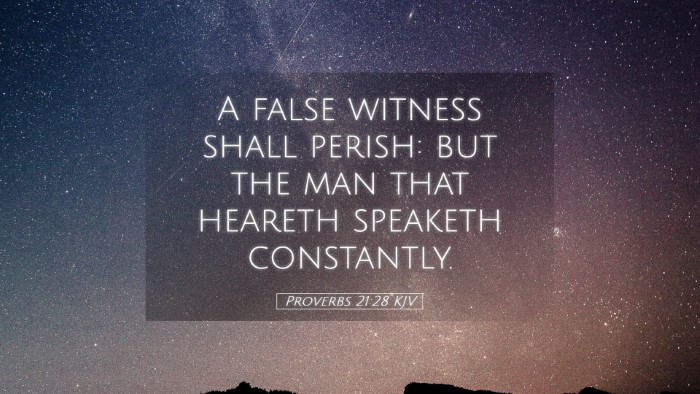Commentary on Proverbs 21:28
Proverbs 21:28: “A false witness shall perish: but the man that heareth speaketh constantly.”
Introduction
The verse in question highlights the consequences faced by those who bear false witness and contrasts this with the reliability of a truthful person. Proverbs, a book of wisdom literature, often juxtaposes the outcomes of righteous and unrighteous behavior, offering a moral framework that is relevant both in biblical times and today.
Analysis of Key Themes
The Fate of the False Witness
“A false witness shall perish” - The term “false witness” indicates a person who deliberately misrepresents the truth, often for personal gain or to harm another. Matthew Henry comments on how such individuals are ultimately destined for destruction, as their deceitful ways lead to their own downfall. In the eyes of God, the integrity of one's testimony is paramount, and He ensures that justice prevails.
The Value of Listening
“but the man that heareth speaketh constantly” - This part of the verse speaks to the importance of being a good listener. Albert Barnes elucidates that a wise person who takes the time to hear and consider what is said does not merely react but speaks thoughtfully and consistently. This contrasts sharply with the impulsive nature of false witnesses who often speak without true understanding or consideration.
Contrasts in Character
This verse effectively contrasts the character of the deceitful individual with that of the wise listener. Adam Clarke emphasizes that the wise man’s ability to listen leads to a more profound understanding of situations. Such individuals not only speak more wisely but also cultivate relationships and build trust within their communities. The contrast here serves as a warning against the perils of hasty speech.
Contextual Insights
Proverbs 21, like much of the book, is filled with practical advice and ethical teachings. The early verses highlight the supremacy of godly wisdom, emphasizing that human reasoning should be aligned with divine principles. In this context, the warning against false testimony is particularly significant, as it undermines justice and societal order.
The Legal and Social Implications
Legal systems in the ancient Near East placed great emphasis on witness testimonies, as they were vital for determining justice. The admonition against false witnessing directly correlates with maintaining the integrity of law and order within a societal framework.
The Spiritual Dimension
From a theological perspective, false witness not only poses societal risks but also represents a grievous sin against God, who is the ultimate truth. The integrity of one's words reflects one's character and relationship with God. Henry points out that those caught in deceit are often imprisoned by their own lies, leading to spiritual decay and eventual ruin.
Practical Applications
For pastors and students of the Bible, the verse serves as a critical reminder of the ethical standards we are called to uphold. Here are some practical applications:
- Integrity in Speech: Emphasize the importance of honest communication in all types of relationships.
- Listening as a Skill: Encourage developing active listening skills, which can lead to a deeper understanding and more effective responses.
- Community Building: Foster environments where truthfulness is celebrated, and deceit is challenged, enhancing communal trust.
Conclusion
Proverbs 21:28 offers profound wisdom regarding the nature of truth and the immense value of integrity in one’s words. As believers, one should strive toward being a vessel of truth, embodying the principles outlined in this verse. As Matthew Henry reflects, the fate of the false witness is inevitable; however, the true testimony lives on, echoing the unchanging character of God’s truth in our lives and communities.
Further Considerations
This verse challenges both leaders and laypersons within the faith community to evaluate their own speech and the motives behind their words. It beckons a return to the foundational truths found in scripture, encouraging us all to speak thoughtfully and live with integrity.


